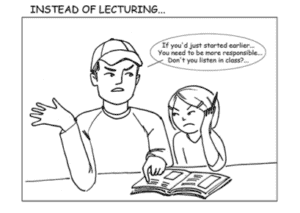We All Have Good Intentions
Do you keep books around that you will someday get to? I have a heap of books encouraging excellent intentions to learn, absorb, and generally ‘be better.’ I collect books that interest me as both a parent and professional. Books that will answer my parenting questions and solve all of my problems. Is that too much to ask? Currently, you’ll find the following gems within arms reach: No-Drama Discipline (Daniel Siegel, MD and Tina Payne Bryson, PhD) Self-Reg (Stuart Shanker, PhD) Hold on to Your Kids (Gordon Neufelt, PhD and Gabor Mate, MD)These books have a lot in common – they are not as well worn as I would like (again, my intentions are good!). They all talk about child development, and they all touch on the holy grail of ‘discipline.’
We All Have Bad Habits
I’ve always been intrigued by the culture of discipline and children. I’m not a yeller by nature, but I’ve certainly yelled at my children. I highly value independence, support problem solving, and try to lead with empathy. Lately, however, I’ve found I’m handing out consequences and offering threats; “If you don’t do X , you won’t get Y!” Or “You have 5 seconds to come here or we aren’t doing X.” I really don’t like yelling. I know yelling is not effective in raising the children I want to raise. So what am I doing?! Why am I doing it?! How can I change?!
A Need to Initiate Change
I have many thoughts on why or how I’ve come to this place of yelling or constant consequences, but that is a post for another time (and likely a lengthy conversation or two with a friend). What I’d like to focus on is what’s next. How can I change my ways? Like any habit, initiating change requires awareness and behavior replacement. I’ve turned to my bedside books for answers and these are the nuggets I would like to share:
1. Please Just Listen!
In Hold on to Your Kids, the authors talk about “connection before direction.” When I think about this concept, I think of my child acting out or throwing a tantrum in public, and I think of me quietly and calmly removing my child, getting down to his level, and connecting with him around that behavior. This approach feels right for me and my children, but I slip out of it. Often we feel that we need to ‘show the child who is in charge’…or are we really just showing other parents that we are in control? Power struggles never end well.
2. Reframing the Behavior
In No_Drama Discipline, Siegel and Bryson have helped me to rethink discipline. Their use of cartoon descriptions makes for easy access to ideas in the moment. (Those moments where you need to lock yourself in your room for a minute because you know you’re too frustrated to deal appropriately with your children? Anyone else have those moments?) (Source: https://www.facebook.com/drdansiegel)
By asking myself why my child might be acting a certain way, it gives me the opportunity to reflect on what my child’s experience is in that moment. Understanding where he is coming from can help me to empathize and move forward. Yes, the limit is still there (“No, you cannot hit your brother”), but it is couched in understanding (“It is frustrating when you don’t get to choose the game”). Using that example, I could use this opportunity to help my child to identify and eventually navigate his emotions. How can I best teach this lesson? After the storm has calmed and we’ve reconnected, I could wonder with him, “What else could you do when you’re feeling so frustrated?” (summary and personal interpretation from No-Drama Discipline, pg. 12-13)
3. Remaining Calm
I mentioned hiding in my room, when I need to step away for a minute during a heated exchange. This is my way of self regulating. Sometimes I turn to music or food; often it is exercise or being outside. These are things I know that I need in order to feel calm and grounded and better able to deal with stress when it (unavoidably) enters the room.Check out Shanker’s Self-Reg for ‘A Parent’s Self-Reg Guide to Self-Care, Sanity and Survival.’ His tips will help you to develop your own self-awareness as a parent, create conditions that support optimal self regulation for you, forgive yourself (YES!), aim for calmness and make time to play – and be present – with your child.
Now What?
Finally, this quote: “The understanding of relationship is infinitely more important than the search for any plan of action.” –J Krishnamurti (as cited in Hold on to Your Kids).
Strategies can certainly be helpful, and I’m sure I will continue to search for answers. But my power is in listening to my child’s needs and in reading my child’s intentions. I’ll let you know how it goes.
PS: Two more books I keep handy but didn’t have space to mention here: The Gardener and the Carpenter (Alison Gopnik, PhD) and Behavioral Challenges in Children with Autism and Other Special Needs (Diane Cullinane, MD). Check them out too!





